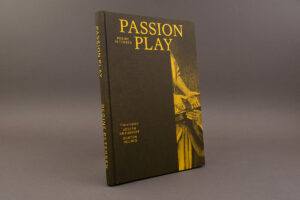YOUR CART
- No products in the cart.
Subtotal:
€ 0

Concept and editing:
Regine Petersen
Reproductions:
Regine Petersen
Text:
Joseph Krauskopf
Burton Holmes
Essay:
Natasha Christia
Editorial assistance:
Stefan Lorenzutti
Translations:
Rachel Hildebrandt Reynolds
Regine Petersen
Design:
Carel Fransen
Lithography:
Henning Rogge
Regine Petersen
Production:
Jos Morree (Fine Books)
Print and binding:
Wilco Art Books (NL)
Print cover:
Klomp Offsetdrukkers (NL)
Supported by:
Stiftung Kunstfonds
Akademie der Künste
NEUSTART KULTUR
I had heard that some had been so wrought up by the play as to become temporarily insane, and run about town haunted by wildest hallucinations.
— Joseph Krauskopf, A Rabbi’s Impressions of the Oberammergau Passion Play, 1900
In the 17th century, when the Bavarian village of Oberammergau was struck by the plague, its pious citizens came together and made a covenant with God. If he halted the disease, they would reenact The Passion of Christ every ten years for eternity.
When the deaths ceased, the villagers delivered on their promise. A makeshift stage was erected, and the Suffering, Death and Resurrection of our Lord, Jesus Christ was presented for the first time. The performance, like many others of its era, put the blame for Christ’s agonies on what was considered to be his evil opponents: the Jews.
Three hundred years after its inception, Adolf Hitler attended Oberammergau’s special Jubilee and declared the Play a cultural treasure.
The 1934 performance is the starting point for Regine Petersen’s (DE) image-text based narrative that unfolds on two levels: that of the world’s most prominent Passion Play and its inherent antisemitism, and that of daily life in the National Socialist village. Postcards of the Play’s protagonists are interwoven with travelogues, local police records and denazification protocols, gradually undermining their propagandistic function and blurring the boundaries between the solemn stage and a disquieting historical reality.
Composed as an allegorical tale with satirical nuances, Petersen’s Passion Play is a virtuosic reprisal of History’s passions for propaganda, populism and moral corruption in their shifting albeit ubiquitous manifestations.
Regine Petersen is a German artist and researcher with photography at the core of her practice. Her work starts with specific and often coincidental findings, which she uses as departure points to gain insight into more universal notions of memory, history, storytelling and ideology.
“There is a theatrical nature to this book in the sense that Petersen is 'staging' these materials as a performance, bringing them together for readers and creating space to reflect upon the relationship between the past and the present. [...] From Petersen’s photographs of the fortress of Masada and the Kofel mountain at Oberammergau, through the array of historic photographs, postcards, engravings and other documents, there is a wealth of material here for readers to study, interpret and make their own connections.” (James Downs)
“A quarter of Petersen’s fascinating book is devoted to an epilogue providing context for her visual testimony of the Alptraum in Oberammergau. Crystal clear and informative. But it is those postcards, the old-fashioned typed police reports, the small personal details, that bring the evil disguised in nostalgia frighteningly close.” (Arno Haijtema)
“Petersen’s Passion Play helps us question how religious figures are represented in art, in theatre, and the political ramifications this may have in real life. The Oberammergau performances are a small manifestation of how we see and think of historical figures, how white supremacism inserts itself into almost every visual facet of our Christian institutions and, if we are that way inclined, our spiritual lives. Then. And now.” (Colin Pantall)